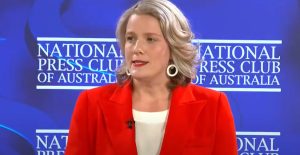Migration system in the government’s sights
Home Affairs Minister Clare O’Neil has doubled down on her view that Australia’s system is broken and not delivering, ahead of the release of a major review.
Ms O’Neil said a report into Australia’s migration and visa system, commissioned late last year, will be released before the federal budget is handed down on May 9.
Carried out by former Treasury secretary Martin Parkinson, the review was instituted following large backlogs of visa processing and claims of migrant worker exploitation.
“It does show that there are aspects of our migration system which are broken in fundamental ways,” Ms O’Neil told ABC Radio.
“It is a system that is unstrategic, it’s complex, it’s expensive, it’s slow, it’s not delivering for Australian citizens or businesses or the migrants who are coming here under it.”
 A separate report conducted by former Victoria Police commissioner Christine Nixon into exploitation in the immigration system will also be addressed before the budget.
A separate report conducted by former Victoria Police commissioner Christine Nixon into exploitation in the immigration system will also be addressed before the budget.
Ms O’Neil said the problem of migrant exploitation was bigger than anticipated.
“The scale is wider than I thought it was going to be, but I think the reporting that was done demonstrates that this problem is significant for the country, and it certainly mandates the government taking action,” she said.
“The most widespread exploitation we see in the system is in the exploitation of migrant workers.
“It’s a problem in migration systems all over the world, but I would say we’re in a particularly acute situation here.”
Ms O’Neil said it was critical for the government to act on the issue, following reports of human trafficking and sexual slavery.
In a recent Opinion piece, Ms O’Neil said that to fix the system “we need to revisit the structure of the program, rebalancing permanent against temporary. We need to sharpen our focus on skills, and think strategically about which gaps we are trying to fill and where we will find them.”
“We need to actively sell our country to high-value migrants, not just sit back and see who we get.
“We need to unlock the potential of our migrants, and properly integrate our migration, our training and education systems, and our labour market. And, we need to design out exploitation as much as we can,” Ms O’Neil wrote.
She said the system was slow and expensive.
“Inertia and drift have infected almost everything. Our system is clogged with arcane, ineffective rules about things like labour market testing and skills recognition.
“I’m not saying we rid the system of these rules, but we need to make sure they’re achieving what they’re meant to.
“Our system is leaving huge value on the table. International students and partners of skilled visa holders could be fantastic workers, but we are not doing enough to help them engage with the labour market.
“Australia’s share of the global pool of skilled migrants has almost halved in the past 30 years. The most highly valued migrants in the world face delay and bureaucracy coming to Australia, and have the red carpet rolled out for them in competitor nations,” Ms O’Neil wrote.
But she said immigration as a significant opportunity for Australia.
“Over the last century, our country has achieved big, important things by inviting people from around the world to come and help us with our national endeavours.
“Migration has been our special sauce. From the post-war clarion call to ‘populate or perish’, to our skills-driven rebound out of the 1990s recession, our migration system has delivered for the country when it met the needs of the moment.”
“Australia faces a host of hugely important challenges. Our economy is stuck in a productivity rut. We have stopped getting better and faster at doing and making things, and median household incomes have been stagnant for a decade.
“Our climate is changing, and the opportunity to transition to a net zero economy is enormous – but we don’t have the skills we need to do it.
“Our ageing population is crying out for health and aged care workers we cannot supply.
“And we face the toughest geopolitical context we’ve confronted since the 1940s. We need to build sovereign capabilities, fast.
Migration can help us solve these national problems,” Ms O’Neil said.
“In the past, Australia has invited migrants to come here so they can set down roots and build a life. Permanency, and citizenship, have been the Australian way.
“Yet today, our large, unstrategic, uncapped temporary program has become the centrepiece of our migration system – and its biggest source of problems,” Ms O’Neil wrote.












